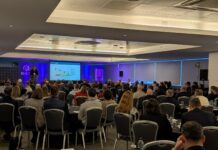
A new study has highlighted the strain that increased competition, political uncertainty and greater scrutiny is having on UK business leaders.
Research of 1,000 workplaces published in Thinking On Your Feet, a report by the commercial arm of the Royal Academy of Dramatic Art, RADA Business, found that 81% of senior leaders said they were often placed in situations where they found it difficult to remain calm.
37% of senior managers, directors and C-Suite executives said high-pressure scenarios made it harder to prepare and express their thoughts. When asked what situations affected their ability to relax and act authentically, 31% of business leaders cited board meetings with very senior people as a leading factor. Video conference calls (30%) also a major causes of nervousness, followed by training sessions (30%), small group meetings (27%), and telephone conference calls (27%).
Rachel Griffiths, client director at RADA Business said, “In any given moment, on any given stage, it is the role of a leader to create and sustain a genuine connection with their audience. It is this powerful leadership performance, rather than an outstanding PowerPoint presentation, that encourages people to follow you and make positive change. Maintaining leadership performance through times of uncertainty demands a greater need to remain present, to align your physical, emotional and intellectual state. This is particularly challenging in the moment when you find yourself needing to think on your feet.
“Under pressure, leaders tend to focus on the content of what they’re saying, losing their personal connection with others, as well as an awareness of how they’re coming across. In the eyes of their audience, they can lose credibility by speeding up their breathing and appearing tense, with no vocal presence – showing a lack of confidence. Actors practice improvisation to develop their ability to give their strongest performance in the moment. When leaders become proficient in the same practice, they become able to manage their state, remain connected and develop a deeper level of resilience and self-reliance in their leadership.”








